Of all the countries to move to, Greece has perhaps the most to offer.
It's got everything from beautiful tranquil beaches, rolling countryside, and towering mountains to bustling cities and eclectic islands all held together by a truly unique way of life.
It's modern and thriving but hasn't lost its rich history. With the longest stretch of coastline of any European country, it's no surprise Greece is growing in popularity with expats looking to move to warmer climes.
The country is also very attractive for expat retirees because of its low taxes and lower cost of living.
Secure Peace of Mind with Best-Value International Health Coverage
International Citizens Insurance provide free, no-obligation quotes from the leading international health insurance providers with plans tailored to meet your needs. Trusted by thousands of expats worldwide.
Greece - overview
Greek culture and civilization have been at the center of the world for thousands of years, leaving each part of Greece with a distinct identity.
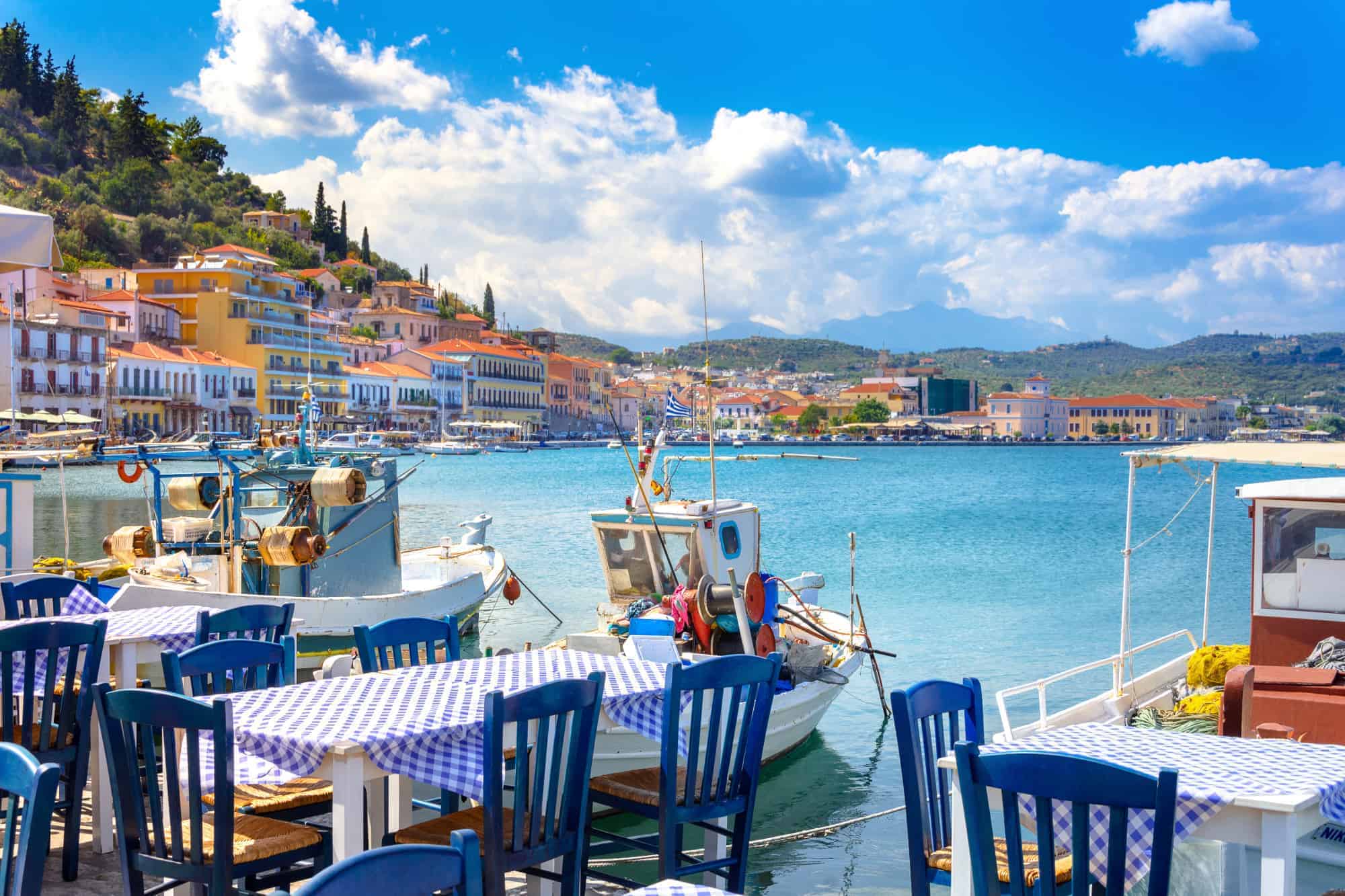
However, knowing which part of Greece is right for you can be challenging. So, we've looked at the very best of what Greece has to offer to help decide where to move.
The breathtaking mountains of the northernmost regions of Greece, including Thrace, Macedonia, and Thessaly, attract fans of an active lifestyle.
The way of life here is based around the wild outdoors with plenty of influences from other cultures, such as Ottoman and Persian, making for a culturally diverse society.
Mountains continue across most of the mainland. Bordered on one side by the Ionian Sea and on the other by the Aegean, central Greece is rich in biodiversity and history. It's here that the traditional Greek values of family and community are prevalent.
The Peloponnese area in the south is riddled with ancient monuments such as Olympia and Mycenae. This region is brimming with tradition and has a very old-worldly feel.
Finally, Greece is well-known for having some of the world's best islands.
The islands are grouped into the Ionian, North Aegean, Cycladic, Dodecanese, Sporades, and Saronic islands. Then, of course, there's Crete. Each individual island offers a wealth of culture and traditions often only found on that island.
Where to live in Greece?
So, where are the best places to live in Greece? With so much variety, the answer genuinely depends on what you want because Greece has it all.
Athens - urban living with character and culture
Greece's capital city, Athens has a lot to offer expats.
If you are looking to live somewhere with all the modern conveniences of a major city but don't want to sacrifice culture or character, Athens should undoubtedly be on your list.

The city is full of charm and historical references. Aside from the major attractions like the Parthenon, Athens has retained ancient features in its streets, squares, tavernas, and across the city.
These little vistas of Greece's epic past mix seamlessly with the more modern aspects of the city, making it a delight to visit. The past and the present merge in Athens in a way they don't quite manage to elsewhere in the country.
As well as being the oldest capital, Athens is Europe's hottest city on average. The temperature here can reach up to 35 degrees every day in the summer months.
The cool summer breeze sweeping in off the Aegean Sea means the city doesn't end up stifling and has a freshness to it, which is unusual for a city this size.
As the capital, Athens has great travel connections with the international airport and train lines to other major cities in Greece. Athens also offers regional flights to most of the larger Greek islands, and you can even grab a boat ride to some of the smaller islands.
For travel within the city, the comprehensive public transport systems mean you might not even need to own a car.
The quality of life in Athens is comparable to any modern European city.
Everything from internet access, road safety, cost of living, and education options are ranked highly not only by native Greeks but also by other expats who've already made the move.
One significant benefit of Athens is that as it is a major commercial city, it's busy all year round. Most things remain open in the winter, and it offers good nightlife, which is rare in some of Greece's more remote locations.
Athens has 19 international schools, multiple universities, and specialist schools, so if you plan to bring children with you, you have a range of reputable education options.
There are 13 hospitals offering all major medical procedures, and Athens offers places of worship for all major religions.
It's also a very green city with the National Garden situated right next to the old town of Plaka, with over 20 other parks dotted throughout the city.
Locals often gather in Filopappou Hill Park in the evenings to enjoy the balmy weather and share a relaxed drink while the sunsets.
Athens, together with Ioannina, Kalamata, Kozani, Thessaloniki, and Trikala, is participating in the EU Horizon Europe’s Mission for 100 climate-neutral and smart cities by 2030.
All in all, Athens has everything you could ever need: culture, history, beauty, modern amenities, good transport connections, and all the benefits of a bustling city.
Chania, Crete – a popular expat hub
If you think island life is more your style, Chania, on Greece's largest island, could be your new dream home.
Chania is the second-largest city in Western Crete after the capital, Rethymno, and the most popular with expats.
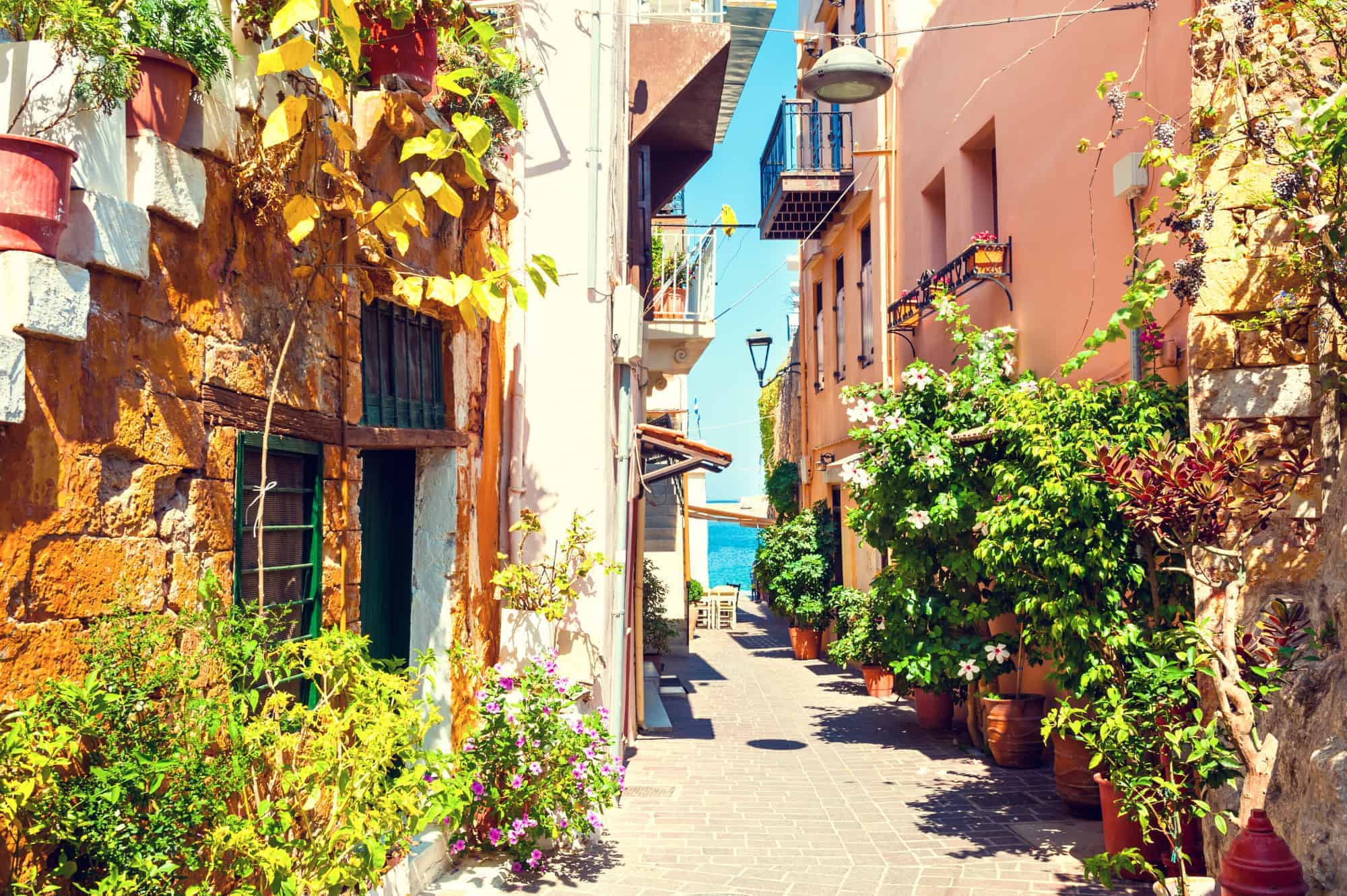
Crete's international community has been steadily growing over the past 30 years. The sense of community and level of support from other expats here is much stronger than you get on the mainland. This definitely makes Crete one of the best places for expats to live in Greece.
Facebook groups set up by expats can help you with everything from taxes and parking tickets to broken kettles and wildlife hotspots.
Situated on the northern coast, Chania has a stunning old town center and a peaceful old Venetian harbor, which is dominated by a beautiful mosque.
The cafes, restaurants, and bars along the front are always busy and full of life, as is the rest of the town.
Right next to the old town on the main road Tzanakaki, you'll find all the modern shops you could need, from Zara and H&M to Sephora, Marks & Spencer, and Tommy Hilfiger.
Chania is big enough to support a proper population, which means it is still a pleasant place to be in the winter months when the tourists have gone.
Winter in Chania is still somewhat Mediterranean, with lows of only around 10 degrees Celsius. The warm weather means the island is home to Europe's largest palm tree forest, rumored to have sprouted from seeds brought by pirates!
Chania was Crete's capital until 1971, when it was replaced by Heraklion in the East. It avoided the worst of the economic crisis thanks to its reliable infrastructure and many tourists.
This means the town has no disreputable or dangerous areas, and local residents often pop out, leaving their homes unlocked and shops momentarily unattended.
Chania is a safe, beautiful town with a strong sense of community. As such, anything it doesn't have can be found by asking your neighbors.
Of course, Chania doesn't have all the amenities, such as large hospitals and universities like the cities on the mainland, but its quiet charm and character make it the perfect place to get away from it all. If lucky, you might even see Leonardo DiCaprio or Lady Gaga walking around town.
It goes without saying the area has fantastic locally sourced produce and delicious seafood.
The cost of living is much cheaper on the island for daily essentials like food, but you'll pay extra for online delivery of other items.
If you are moving, take as many household electrical items with you as you can, such as washing machines, food mixers, etc., as they can be pretty pricey on the island.
Having said that, rent is relatively cheap, as are most house prices, so taking the plunge isn't going to be expensive.
Travel around the island is limited to cars and a few local buses, which navigate the winding mountain roads with surprising ease. However, it is recommended that you have your own form of transport, perhaps a boat!
Crete is ideally situated to access both the mainland and other nearby islands, and the ferries are regular and reliable.
Chania has a lot to offer for someone looking to move away from the city's hustle and bustle but isn't looking to move into the middle of nowhere. The island community means wherever you turn, help is at hand, either from friendly locals or expats who make up a fair share of the population.
You can find more information in our guide, Living In Crete As An Expat.
Thessaloniki - the country's gastronomical capital
Situated in the north of the country but still bordering the sea, Thessaloniki is well-loved by expats. If you're looking for a climate with warm summers and real, snowy winters, Thessaloniki might appeal to you more than the Mediterranean climate in the south.
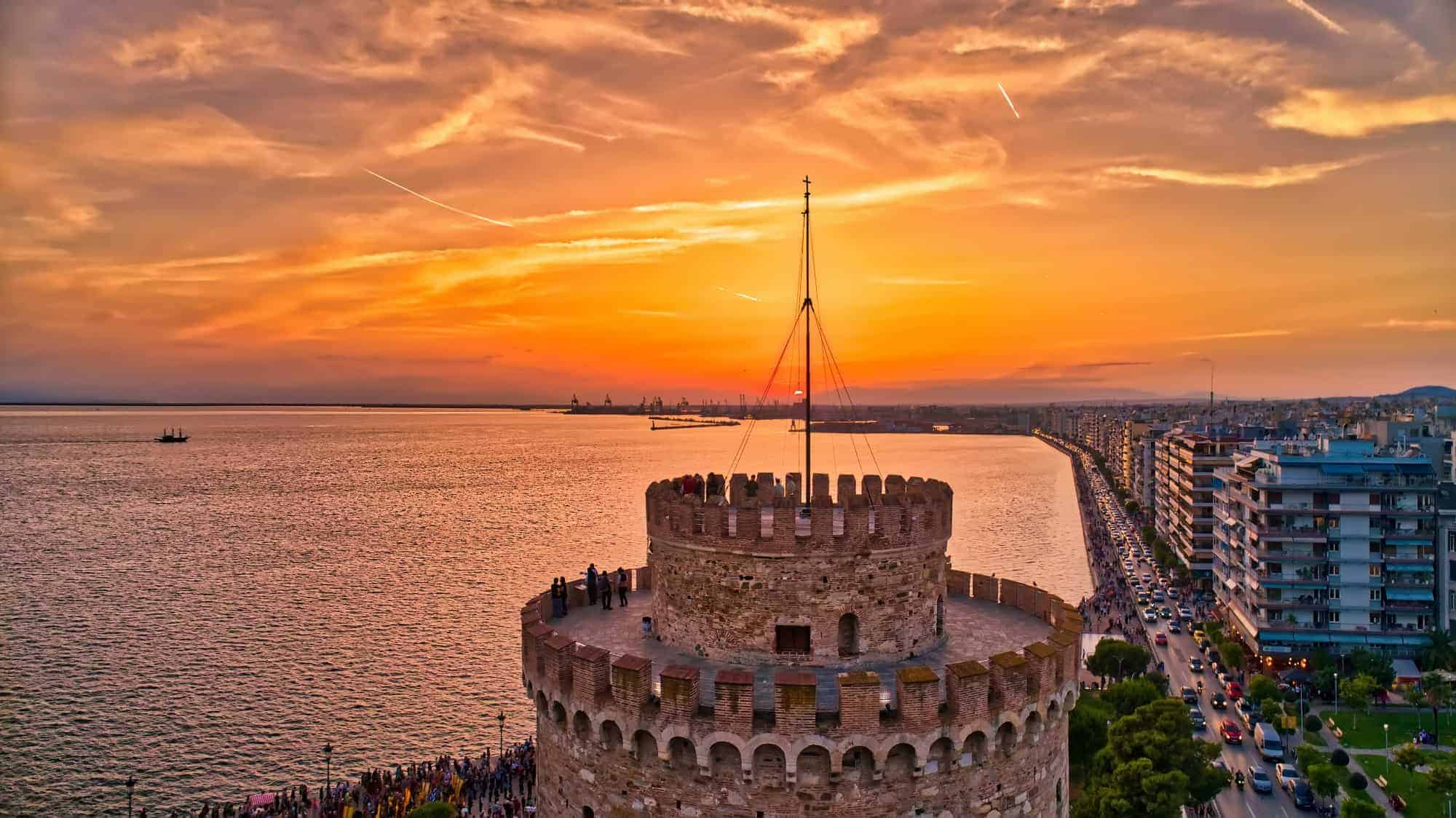
Thessaloniki is a port city situated on a gentle downhill slope towards a protected bay, making it popular for fishing vessels, large ships, and brave swimmers.
Being so close to the sea, it has a stunning promenade and enjoys a fresh sea breeze which is welcome in the hot summers.
Unlike Athens, the busy, bustling capital, Thessaloniki has a more relaxed atmosphere. There is a great focus here on the art of doing nothing, enjoying good food, and some inspiring Greek culture.
In fact, Greece's second-largest city is the country's gastronomical capital.
In the past, the city was heavily influenced by the Romans, Ottomans, Byzantine, and Hellenistic empires, meaning it has a kaleidoscope of influences.
The myriad of cultures collides here to offer various cuisines to suit any taste. The wealth of natural products in the area, from seafood, herbs, and mountain teas to the produce grown on the fertile river deltas, means the markets are overflowing with delicious fresh produce.
There is also a delightful locally-produced wine to wash it all down, but don't get carried away - it tastes light but can give you a very heavy head the next morning!
Besides food, the city also has its fair share of Greek ruins, ancient monuments, and historical vignettes that make for a charming, traditional atmosphere.
There are stunning arches, temples, churches, marble columns, stone facades, and original frescos all over the city.
Unlike other areas of Greece, the city's archaeological bones have been as heavily influenced by outside cultures as the food, making this city perhaps even more stunningly beautiful than Athens.
Of course, beautiful ruins and good food don't necessarily make Thessaloniki an excellent place to live. The city has plenty to offer in terms of culture, including theatres, cinemas, art galleries, gardens, and even an annual film festival.
The Aristotelous Square on the waterfront is a popular place to sit and relax, not to be confused with the Aristotelous Square just streets away next to the fantastic covered Modiano market in the center of the shopping district.
Despite being smaller than its southern cousin, Athens, Thessaloniki offers all the same amenities.
Everything you expect to find in a major city is present, including three hospitals, four international schools, public transport, and a major university, and it is currently undergoing a significant rail renovation to improve connections.
The nearest airport is a little way out of the city in Macedonia, but the major port means the city is still very accessible.
If you're looking for good food, Greek culture, proper winter weather, and all the benefits of a modern city but want to live life at a slightly slower pace than busy Athens, Thessaloniki is for you.
Corfu - a unique and independent character
If you've ever watched the Durrells and wished you could be whisked away to a sunny paradise full of laughter, family, and life by the sea, then a move to Corfu could be in your future.
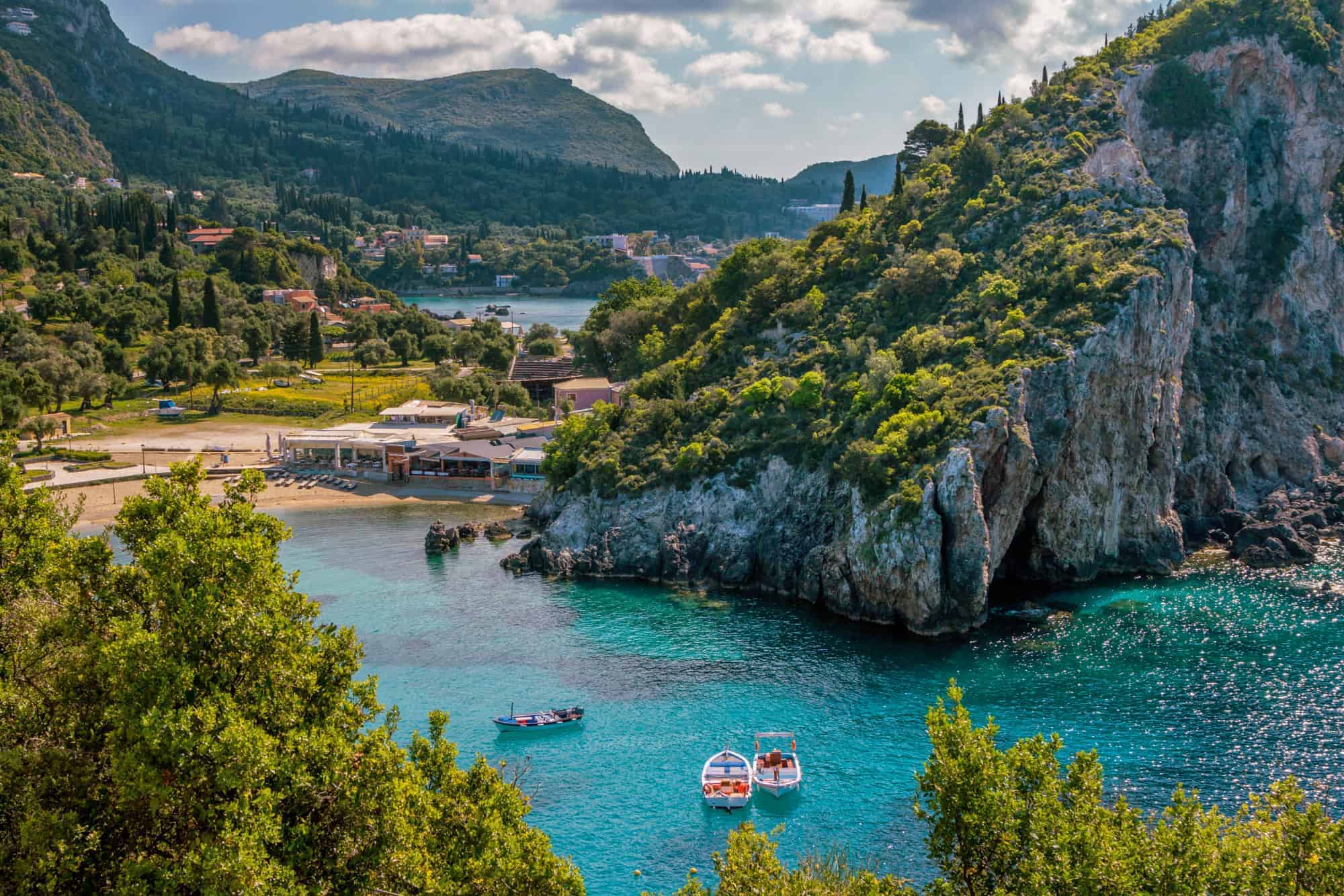
Aside from the Durrells, Corfu has captured the hearts of ex-British Prime Minister William Gladstone and Hollywood stars Vivien Leigh and Laurance Olivier.
Corfu has swathes of untouched land that are quite literally where the Durrells lived and where the drama series was filmed.
The greenery and perfect beaches make it an ideal home for anyone who loves spending time outdoors. Corfu's coastline is more dramatic than most other islands, giving it a wild and rugged feel. It's truly a place to get back in touch with nature.
Corfu town is one of the most culturally diverse towns on any Greek island. The island was home to several invading armies over the years, including the Italians, who left a distinct mark. The blend of cultures gives the island a unique feel, which isn't truly Greek but feels somehow more exotic and exciting.
The Old Town itself is a Unesco World Heritage site, and the two fortresses that dominate the harbor also provide a stunning panoramic view of the city if you can climb to the top.
Mixed with Italian and Greek influences, the town has remnants of the old Spanish empire and pockets of British culture, including an old cricket field.
Like most Greek islands, Corfu, specifically Corfu town, has enough restaurants, bars, cafes, and tavernas to spend a lifetime in. Summer prices can be a little high, so watch where you go.
On the whole, living in Corfu town is generally relatively cheap. Local produce is abundant and delicious, apartments are reasonably affordable to rent, and plenty of businesses keep competition high and prices low.
Large sections of the town near the harbor are for pedestrians only, meaning getting around on foot or by bicycle is easy and enjoyable.
Unlike other towns, Corfu has a stunning beach extremely close to the center.
The center is dominated by old yellow stone buildings, palm trees, and more aches than you find in Rome. This gives it a very colonial, tropical feel, which continues after the tourists have left and the warm winter sets in.
Corfu town stays very lively during the winter months, making it a better place to live year-round than some of the other towns.
The main airport and port are situated right in the city, meaning there are always fresh supplies and larger appliances, and online purchases are easier to come by here than on other islands.
Having said that, if you enjoy shopping, the old town is separated from a very modern shopping district by the main Stamatiou Desila road.
If you want to live somewhere with a unique, independent culture, Corfu could be your dream. The island has plenty of Greek culture mixed with its rich and diverse past. The connections to mainland Europe and the UK make it a much easier move than a smaller island.
You can find more information in our guide to Living In Corfu.
Patras - vibrant and dynamic
When it comes to entertainment, nightlife, and a thriving downtown area, Patras, situated in the northwest of the Peloponnese area, is the best Greece has to offer.

Patras is known as having a beating heart much larger than the city's size would suggest. Just take a wander through the town during the annual Patras carnival to get a taste of the city's character.
Although the city does have a dedicated old town with stunning stone walls and archaeological ruins, it is somewhat contained in one corner of the city.
Many of the small streets off the main Korinthou and Maizonos boulevards are pedestrian-only and are packed with every amenity, bar, club, museum, gallery, and shop you could ever need
Patras is ideally situated for anyone who enjoys the outdoors. Its proximity to the sea, island, and mountains makes it a real haven for anyone who wants to enjoy the Greek countryside. The city relies on its closeness to the countryside as it has just two major parks set on opposite sides of the city.
The large port and flowing river make Patras a hub for commercial activities, and many expats find it easy to pick up additional work in the city without any problems.
The living costs are fairly low. With so much available, there's healthy competition between businesses, which keeps prices lower than in some other cities.
Patras has the heart and commercial prospects of a large city but the community spirit of a much smaller town. If you want a lively, busy city with access to rural areas, Patras should definitely be on your list.
Rhodes - a good blend of traditions and modern living
Rhodes is another one of Greece's well-known islands. It's renowned for a reason: life here is good.
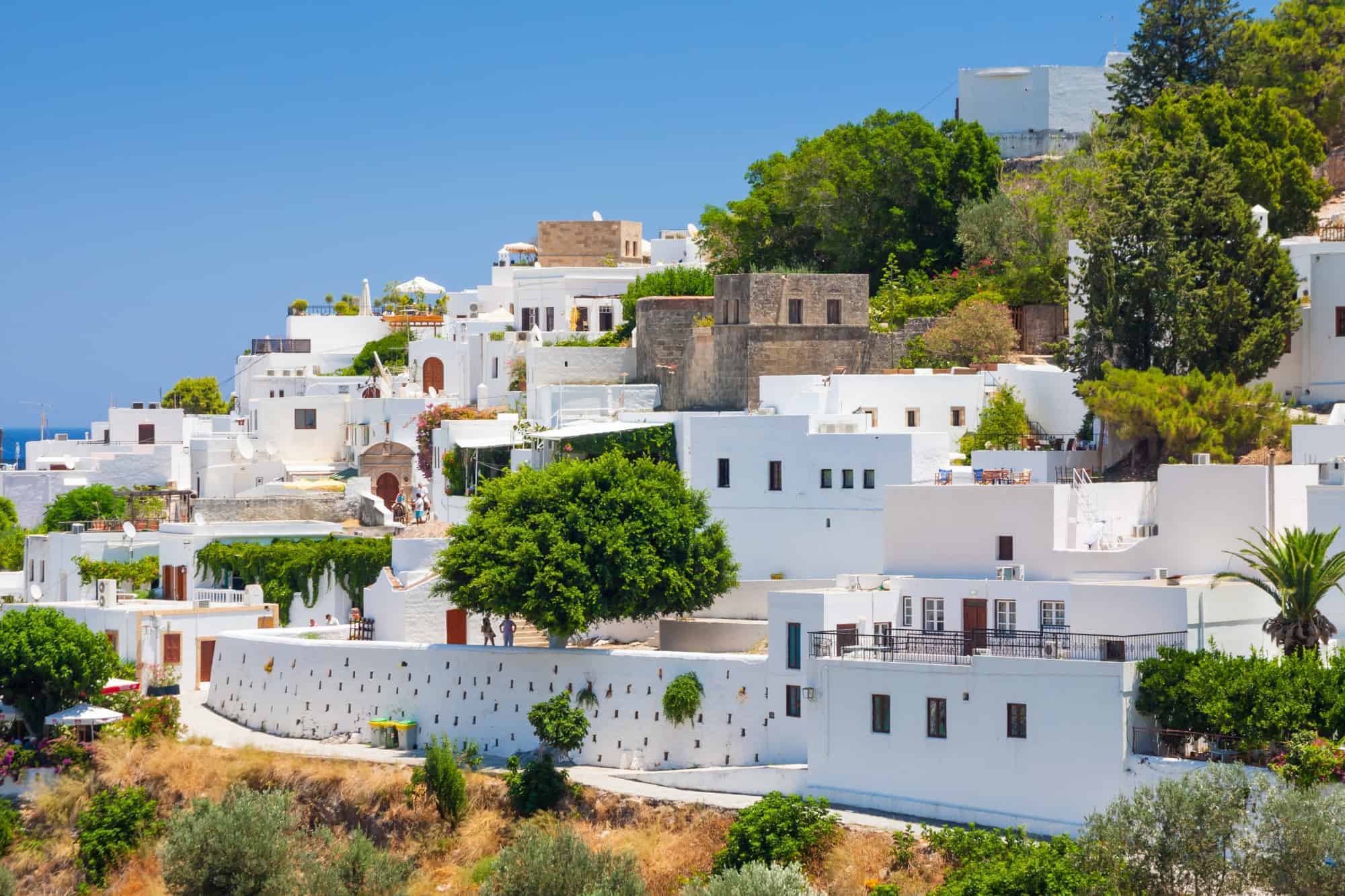
Rhodes is large enough to offer good healthcare in the hospital and enough jobs that if you want to work, you will be able to find work easily. However, it's small enough to offer a real sense of traditional Greek life.
Rhodes Town is a stunning town divided into two distinct sections: the old town and the new one.
As with much of Greece, the historic old town has some serious charm and is packed full of little bistros, tiny storefronts, and windy alleyways.
One street away, behind the Palace of the Guards, you'll find yourself in a new town surrounded by shops like Zara, the central bus station, and the public swimming pool, which is surprisingly popular for a town by the sea.
The dichotomy between the two personalities in Rhodes can be shocking but makes for an exciting place to live.
The newer part of town has more amenities for living. You'll find doctor's surgeries, building yards, tech stores, lawyers' offices, and more. It really feels like an oversized village.
There are plenty of expats already living in Rhodes town, and they have a strong bond, helping each other out with everything from language lessons and pension forms to the best bars and how to find work.
The whole island is easily accessible with a decent and reliable public transport system, but as with most islands, having your own transport is best. Getting off the island is also relatively easy, with regular ferries to the mainland and several airports, including an international one for direct connections.
Island life may be idyllic, but it does come with some downsides; the internet can get very slow on Rhodes (as with all the islands), and shopping for large pieces of furniture is very limited and pricey.
On the plus side, the food is locally sourced, the people friendly, and the way of life is slow, comfortable, and relaxed. The island itself is surprisingly green for a Mediterranean island due to the rainfall in winter.
Rhodes Town might be the most popular place to live on the island, but the entire island feels like one big town, albeit a bit spread out. You're sure to find people who will help you with the move but consider bringing as much with you as possible.
The best places to live in Greece - summary
Our list of the best places to live in Greece is not inclusive. There are many more locations worth considering.
You might want to look more closely at Syros - a well-serviced island with its own airport in the heart of the Aegean Sea. Or, after considering the pros and cons of living in Santorini, you might decide that this super-expensive island is worth the high costs.
Wherever you choose, when planning your move to Greece, make sure you do your research so you don't get "culture shock" when you arrive, as you'll have plenty of other things to be arranging.
Most expats say they wish they had relied more on other expats upon arrival. Greece has a fantastic community of expats willing to give advice, lend a helping hand, or just have a chat over coffee.
Don't be afraid to reach out. One of Greece's defining features is its friendly, relaxed way of life. Moving to Greece isn't just about moving to another country. It's about a whole new way of living, and it could very well be the best thing you ever do.
Do plenty of research, ask around, rent to test a place out, and travel around until you find your ideal location. After all, this isn't a two-week holiday; it's your new life.
Enjoy it!
You might find useful:
- Living In Greece – The Expat’s Guide: a detailed guide on moving to Greece that covers visas and residency, paperwork, the costs, the pros and cons, the healthcare and property matters, etc.
- Visas And Residency Options In Greece For Non-EU Nationals.
- All European Golden Visa Schemes For Residency By Investment
- The Expat Guide To UK Pensions Abroad: Understand Your Options
- Didn’t find what you were looking for or need further advice? Comment with your question below and we will do our best to help.
Helpful external links:
- Find your most suitable climate zone in Greece - Forests.jrc.ec.europa.eu.
- Cost of living in Greece in various regions - Numbeo.
- Greek cities' infrastructure makeover - InterTraffic.com
Secure Peace of Mind with Best-Value International Health Coverage
International Citizens Insurance provide free, no-obligation quotes from the leading international health insurance providers with plans tailored to meet your needs. Trusted by thousands of expats worldwide.




